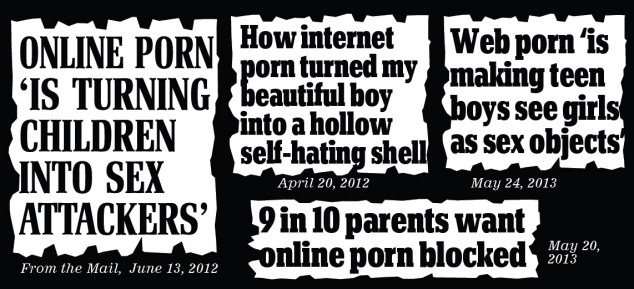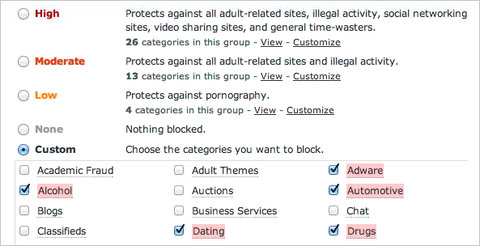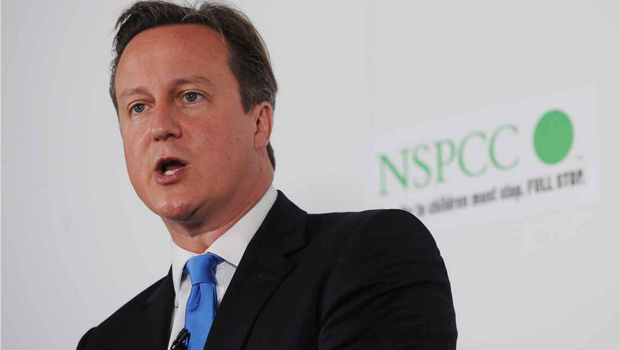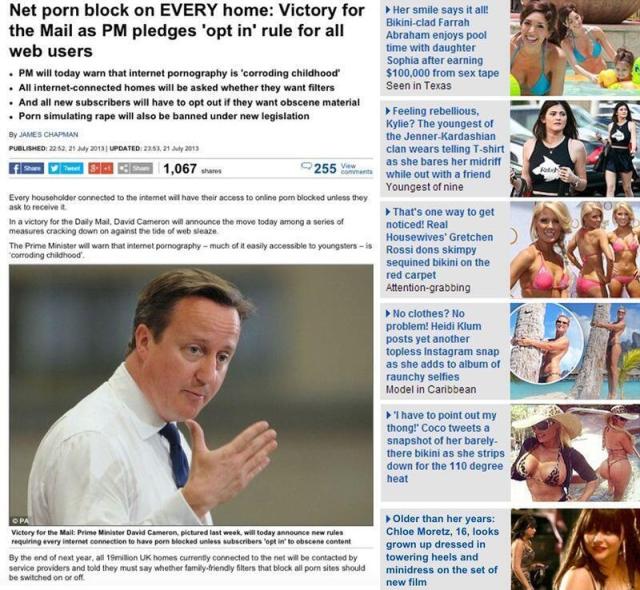In the most recent episode of Won’t Somebody Think of the Children?, UK Prime Minister David Cameron announced that ISPs will be blocking “legal pornography and other adult subjects” by default because online porn is “corroding childhoods.” The four biggest ISPs have agreed to comply — covering 95% of UK households — and, by 2014, all new and existing customers will need to proactively opt out of porn filters.
Let’s get the easy arguments out of the way. Relying on network-level filtering, which is far less robust than device-based systems, to block content — that’s not how the internet works. Crossing your fingers that those under the age of 18 lack the technical literacy to find workarounds, even as you still rely on them to teach you The Google — that’s not how children work. And scanning the big, bad internet for a few big, bad terms in the hope of catching a few elusive big, bad people — that’s not how online crime works.

via Daily Mail
The internet is not a safe space. This is a problem. But flawed attempts to make it one could be actively harming those for whom safe spaces will be compromised by an indiscriminate default-on porn filter.
In 2002, in response to the U.S. 2000 Child Information Protection Act (CIPA), JAMA published a study titled “Does Pornography-Blocking Software Block Access to Health Information on the Internet?” The work surfaced two key findings: first, the more restrictive the filter settings, the more health information sites — including Planned Parenthood — got disproportionately blocked.
At the least restrictive blocking setting, configured to block only pornography, the products blocked a mean of only 1.4% of health information sites. […] The mean pornography blocking rate was 87%. At moderate settings, the mean blocking rate was 5% for health information and 90% for pornography. At the most restrictive settings, health information blocking increased substantially (24%), but pornography blocking was only slightly higher (91%).
It’s worth keeping in mind that translating those percentages into reality requires considering how the sheer number of porn sites easily overshadows sexual health ones.

Second and more worryingly, sites to do with sexuality are disproportionately blocked.
However, [at the least restrictive setting] about 10% of health sites found using some search terms related to sexuality (eg, safe sex, condoms) and homosexuality (eg, gay) were blocked.
While the internet and the way we use it have obviously changed a great deal since 2002, it’s not clear that the network-level filtering that’s under discussion would have a more nuanced approach to blocking objectionable content.
The UK already has a form of widespread content filtering in place: most mobile providers switch parental-control filters on by default. The process by which sites are filtered is inconsistent across providers and largely opaque, relying on a broad, self-regulated framework that was last updated in 2009. Open Rights Group, a UK-based digital rights advocacy group, released a study in 2011 in conjunction with the London School of Economics & Political Science noting that these filters were often overzealous.
Firstly, sites are often incorrectly classified as containing objectionable material. Second, phone operators aren’t forthcoming about the details of how their filtering systems work or what kind of content they block. Third, it’s not clear how to report sites that are erroneously blocked. Finally, it’s difficult even for adults to turn the filtering off.
Just earlier this year, sites to do with homosexuality, feminism, and even political satire were blocked by mobile providers as “mature content.” Pink News reported that mobile providers were blocking access to their site and other LGBT interest websites. As Willard Foxton at the Telegraph put it, “This was bad enough when these services were blocking porn […] but now it seems overzealous providers are blocking access to anything a Catholic Bishop might consider for adults only.”
Cameron is still waffling on the details so lots of unanswered questions remain as to what exactly these filters will block. How will these sites be decided, who’s deciding, and who’s regulating the regulators?
It’s virtually a given, however, that sites linked to sexuality and sexual health will be taken down as collateral damage. It remains paralysingly hard for porn-sifting algorithms (and people) to tell “horny am4teur college chicks b@nging” and “How to Have Lesbian Sex for the First Time: NSFW Sunday Special” apart. Sex/uality education and support for LGBTQ teens already leaves a great deal to be desired, and this could potentially restrict access to crucial information and support even more.

The next phase involves pushing for keyword blocks on search engines like Google and Bing. Given the transnational implications of this, it’s likely to face a lot more pushback from the industry; additionally, Google has repeatedly pointed out that it already actively works against online child pornography.
What receives even less attention than sexual health & sexuality-linked sites is what keyword blocks would mean for abuse survivors looking for support or information online. Child abusers share illegal material over peer-to-peer networks and other less easily located channels, while vulnerable people rely on search engines and online social networks to find spaces where they can make sense of what happened to them or find others to talk to. It’s easy enough for David Cameron to condemn “depraved and illegal search terms,” but for far too many people, those terms describe their actual experiences, and not being able to see their experiences reflected on the internet can increase feelings of isolation.
The move appears to be engineered to garner widespread mainstream support. It’s not an issue of a centre-right Conservative social agenda: Labour not only backs it, but wants “filters on all ISPs and a proper age verification system” among other additional measures. Cameron made his speech against the backdrop of the National Society for the Prevention of Cruelty to Children (NSPCC) HQ, bundling this measure with others like a ban on porn depicting rape that the End Violence Against Women Coalition is “delighted” about. The Daily Mail sees no hypocrisy in running a victory lap.

via @samradford
Yet these issues – and these are all separate issues, for child abuse is not child “sexualisation” is not rape glorification is not political posturing on who can do more to Save the Innocent – are layered in so many levels of disagreement any “universal” approaches should be immediately deemed deeply suspect. Certainly the problem of objectionable and dangerous sexual content on the internet is real and worth addressing, but it’s not yet clear whether this is the way to go about it.







